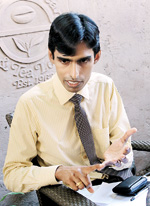One-to-one communication that does a whole lot of good
From the measured tone of voice of Dr. Asiri Rodrigo it is obvious that the caller is desperate. It is the mother of an undergraduate seeking help because her daughter is threatening to take her own life.

Dr. Asiri Rodrigo Pic by Anuradha Bandara
Usually what Dr. Rodrigo extends to his patients is not just medication which he is very well qualified to prescribe as a Consultant Psychiatrist.
It is a blend of medication and psychotherapy, depending on the need of each patient, for this Psychiatrist has also had advanced training in this sphere as well. Passing out from the Colombo Medical Faculty in 2003, it was his fascination with the human mind that led him not only to specialize in psychiatry but later psychotherapy in Melbourne, before returning to serve his country.
What he extends to his patients is a “mix” of traditional treatment and counselling or psychotherapy, MediScene learns.“Some patients may need medication, others counselling and still others both medication and counselling,” explains Dr. Rodrigo who is also a Senior Lecturer at the Ragama Medical Faculty of the Kelaniya University.
 The statistics on psychiatric illness seem grim with the need for such treatment being vital. Psychiatric illness is on the rise, says Dr. Rodrigo, pointing out that according to data one in every 20 people in Sri Lanka at any given time is depressed.
The statistics on psychiatric illness seem grim with the need for such treatment being vital. Psychiatric illness is on the rise, says Dr. Rodrigo, pointing out that according to data one in every 20 people in Sri Lanka at any given time is depressed.
While quoting figures in the United Kingdom and the United States of America that one in every four persons has some mental illness, which may also be applicable to Sri Lanka, he says that a research done in Jaffna by Prof. Daya Somasundaram has found that 20% of the Jaffna population is depressed.
Another study of adolescents done in the south, in Galle, gives a shocking figure of 57% having depressive symptoms, according to him.
“For many child psychiatric illnesses such as anxiety disorder, personality disorder and sexual problems, psychotherapy is the answer and not medication,” says Dr. Rodrigo.
Referring to other mental illnesses such as depression, he points out that in 30%, it is medication-resistant and psychotherapy is the option. The proof that medication is not working comes with the condition of many people who are having mental illness not improving or relapses occurring. This means that medication is not addressing the vulnerabilities which necessarily need to be dealt with by psychotherapy.
It is known that 1 in 3 patients suffering from depression cannot be treated only with medication, but needs psychotherapy techniques to make them better. Therefore, each patient needs to be assessed and medication, psychotherapy or a mix of both administered, MediScene learns.
“Then, especially when given both, after assessment, the patient gets better quicker and remains well. As such, it is also cost-effective,” reiterates Dr. Rodrigo.
Psychotherapy can also deal with day-to-day issues that many Sri Lankans face such as unhappiness which could include emotional issues, parenting issues, relationship issues, job problems and anger and also physical (unexplained somatic) symptoms which do not seem to get cured after medical treatment.
Recently he has treated a bright young girl, daughter of two professionals, who was anxious about the Ordinary Level. She was second in class but unhappy about herself, with the root of the matter being that she was being compared to her elder sister who is a medical student. “There was lack of self-worth exacerbated by self-doubt,” he says.
Another was a 23-year-old whose parents had died in a car crash when he was just two years old. When he was being looked after by his grandparents, his grandmother too had died and when under the wing of the uncle, he had got a stroke and become paralysed. Many people had tended to label him a “moosala kolla” (wretch).
His ambition was to become an astronaut, says Dr. Rodrigo, but he was being weighed down by the opinion of others. Psychotherapy became his lifeline. He had a dream that he could achieve if only he could conquer self-doubt and performance anxieties and believe in himself.
Pointing out that Sri Lanka is way down at the 137th spot in the ‘Happiness Index’, Dr. Rodrigo picks out what most of us see daily — road-rage which is common. “Managing emotions seems to have become an issue for Sri Lankans, including anger management, along with violence not only being common but also acceptable.”
The old safeguards provided by religion and extended families have vanished, with the rat-race taking over and people not having time to engage in religious activity. There are also more and more nuclear families, so the strength provided by extended families has waned, it is learnt.“There is a vacuum, an unmet social need,” says Dr. Rodrigo, adding that psychotherapy could become the mediator.
Of course, there are also certain barriers in the thinking of the people that it is not good to open up to a stranger, even though the stranger may be a doctor; the huge “perceived” gap between the doctor and the patient; and the misconception that psychotherapy is “a western concept” and as such “how would it help us?”.
There is no cultural alienation at all, points out Dr. Rodrigo, adding that psychotherapy is actually oriental. It brings out the Buddhist principles.
Stressing the vital need for more psychiatrists to get trained in ‘medical psychotherapy’, he says that it is because they see a large number of patients with mental illness including those with severe depression, resistant depression and resistant obsessive compulsive disorder. Then they would be in a better position to treat those with mental illness.
“The mind is powerful. It can make you do great things or destroy you. But you need to believe in yourself,” is Dr. Rodrigo’s simple theory.
What is psychotherapy?
It is a communication or interaction between two people — a trained therapist and a client in “a safe environment” — with the intention of healing. There is no other relationship than being therapeutic. There is no friendship. Psychotherapy will not change the actual problem but change the views of that person about the problem.
Here are some of the categories of psychotherapy which are helpful in different situations:
Cognitive behavioural therapy — citing an example, Dr. Rodrigo says that when a person gets into the elevator and says “good morning” to a colleague already there, if there is no response, the immediate thought would be “that person is angry with me – I too should be upset and angry; that person didn’t hear me – there would be no change in my feelings; that person is preoccupied – I should be concerned”. It would result in the behaviour of the person who said good morning changing in this manner – “I won’t talk to him; I will ignore him; or I need to approach him”.
Different moods could bring out different behaviours, says this Psychotherapist, explaining that there is a close relationship among thoughts, mood and behaviour and as such if the thinking pattern can be changed, mood and behaviour will follow suit.
Child Psychotherapy – here one needs to take a closer look not only at the child but also at the family, because problems may be manifesting in the child due to the family being dysfunctional. “We then check out the family dynamics and improve communication between members of the family, parents and children, children and children and also parent and parent. If there are maladjustments, those should be changed to more adaptive family dynamics.
Interpersonal therapy – people may go into depression due to numerous reasons such as a loss, breakdown in relationships and even impending loss. “We address that need or loss and improve interpersonal effectiveness,” says Dr. Rodrigo citing the example of an eminent, much-sought-after person facing a role-reversal or loss of role after retirement.
Cognitive errors – people who see some issue as only black and white, but no ‘greys’ or in-betweens; catastrophisation – where they see only negatives; lack of assertiveness; and also poor coping skills.


